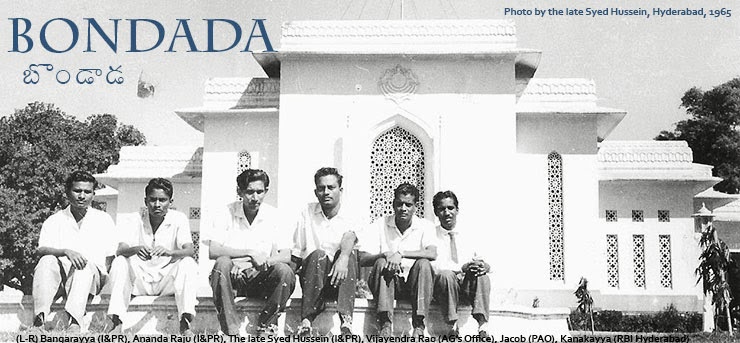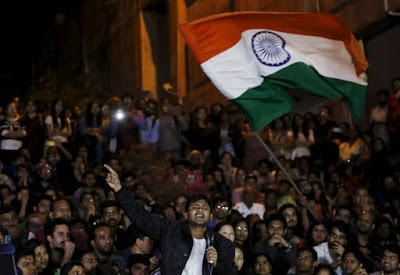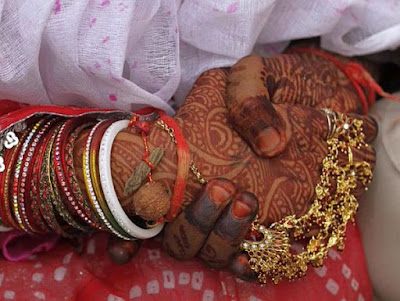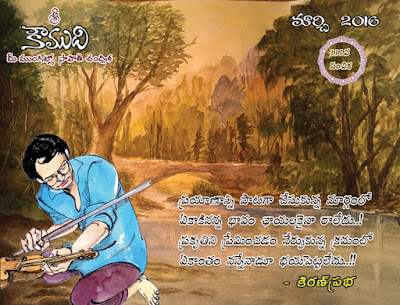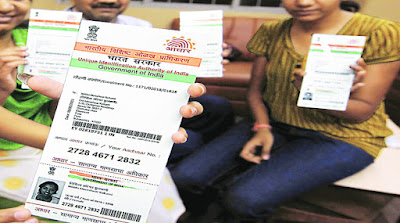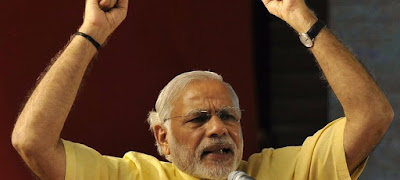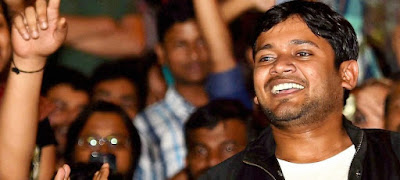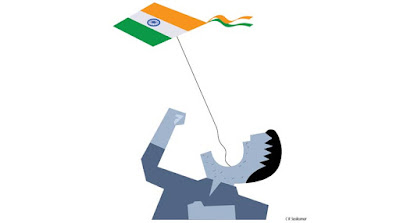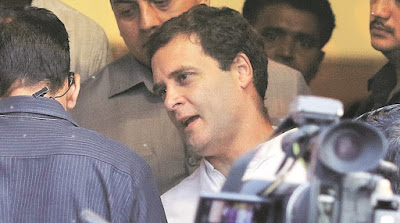Dear PM Modi, It is treasonous to not pay attention to the needs of poverty-stricken children while pretending to be patriots jailing university students for 'ant national' slogans.
Written by Ujjal Dosanjh | Published:March 15, 2016 9:29 am
To my mind, what is most anti-national is to not see, acknowledge and eradicate this grinding poverty of India. Reuters
I am feeling “seditious”. I am. I am in India, my motherland, the land of my ancestors. I can literally feel the centuries of Indianness coursing through my veins. Though the arms I think of are of the peaceful variety yet it is impossible to escape the call of my conscience to arms.
From India I have been following the events surrounding the JNU and the allegations of ‘sedition’ and ‘anti-national’ being thrown about so recklessly. There can’t be any real danger to the world’s largest, well grounded and enduring democracy from some students shouting what may or may not have been irresponsible slogans. India is not some airy fairy place that is going to be torn asunder just because some students talk about whether Afzal Guru’s hanging was legally proper and just.
No one has the right to dictate what thoughts one can think or articulate even if they may be questionable in their very essence or how they are crafted including those that may cast doubt on the legal propriety of Afzal Guru’s hanging by India.
I have no time for any one picking up a gun to kill or attempt to kill any one let alone the parliamentarians of Indian democracy that Afzal Guru’s alleged associates did. And I have no time for those who glorify others such as Nathuram Godse who, in liberated India, killed the undisputed leader of the freedom movement.
One could call those who glorify Guru or Godse or others like them misguided, gone astray or completely wrong. But in a true democracy they have a right to be misguided, wrong or to be led astray. To call them seditious is to cheapen true patriotism and think India weak and believe that it will readily crumble under the weight of sloganeering by students at universities.
I would urge the self styled definers of “patriotism” and “nationalism” in India to stop constraining individual freedoms and start worrying about students at its universities turning into book worms who never read a newspaper, shout a slogan or attend a demonstration to change the country. If all the students become solely preoccupied by the marks they get at universities and how big their pay packets might be, in the end India will be a much lesser country and certainly not the country of the dreams of its freedom fighters.
A degree of sedition and subversion, in other words an undermining and challenging of the status quo, is inherent in any movement for change. In that sense, RSS is subversive as it wants to change the nature of Indian state and so are all the political parties worth their name who have differing visions of India. If they intend no subversion of the extant reality — the status quo — then they have no business in politics unless they are in the business of massaging their own egos or plundering the country.
As I write this column on the train from Delhi to Phagwara, I occasionally lift my sights away from the keyboard of my computer and see acres and acres of wheat and other green crops in the vastness of Haryana and Punjab. I also see the poverty in the shanties and jhuggies lining both sides of the railway tracks. The surroundings of these dwellings, if one could at all call them dwellings, are littered with runaway plastic and other garbage. There are small ponds, puddles and sewers of waste, mainly dirty water mixed and polluted with all manner of waste both human and animal. This is where a significant part of the future of India lives — in those shanties, in the midst of that plastic, human and animal waste and the sewers of stench. This is where the children of the shanties play and grow up. None of it seems at all touched by the Swachch Bharat or any other grand schemes or plans of state or central governments past or present.
To my mind, what is most anti-national is to not see, acknowledge and eradicate this grinding poverty of India.
This is the kind of extreme poverty that is everywhere in India. It lives alongside and in sight of the extreme wealth. Those half naked children playing in front of and around the shanties are what the government should worry about instead of the students at universities shouting slogans mildly subversive of the status quo. Those children, dressed in rags, play and live — no, I must say exist — right next to cows and other animals chewing gobs of plastic as they graze on the patches of dying grass littered with the ubiquitous garbage all over India. One day they are going to — and they must if India is to have any hope of change — grow up and join the university students such as Kanhaiya and Khalid to subvert the status quo that has kept them and their parents in such extreme poverty.
Prime Minister Modi, here is the naked truth:
It is treasonous to not pay attention to the needs of these children while pretending to be patriots jailing university students for ‘ant national’ slogans;
It is not seditious to shout anti government slogans;
The BJP government is not India. For that matter no government ever is or has been India despite Indira Gandhi and her sycophants once believing so and imposing the hated Emergency in what they claimed was national interest;
It is sedition pure and simple, Prime Minister Modi, for the governments of post independence India to have allowed poverty to remain at alarming levels, to allow corruption and communalism to grow and to enable all three to have a deadly strangle hold over the country.
And, Prime Minster Modi, I have harboured and expressed these thoughts all my life. Being forthright and honest is sedition too in the eyes of the defenders of the status quo. I do not believe one whit in the status quo in India on caste, communalism, poverty and corruption. Therefore I must plead guilty to being seditious and subversive.
On behalf of those children I saw playing outside their shanties on both sides of the railway tracks and hundreds of millions of other poor Indian children I CHARGE ALL GOVERNMENTS OF INDIA SINCE 1947 WITH SEDITION FOR BETRAYING THEM–A CRIME far more serious than some angry slogans of a few angry students.
And yes! For levelling the charge of SEDITION so publicly against all Indian governments to-date I may be, according to the newer and twisted definition of sedition, GUILTY of SEDITION /SUBVERSION — take your pick.
Views expressed by the author are personal.
Written by Ujjal Dosanjh | Published:March 15, 2016 9:29 am
To my mind, what is most anti-national is to not see, acknowledge and eradicate this grinding poverty of India. Reuters
I am feeling “seditious”. I am. I am in India, my motherland, the land of my ancestors. I can literally feel the centuries of Indianness coursing through my veins. Though the arms I think of are of the peaceful variety yet it is impossible to escape the call of my conscience to arms.
From India I have been following the events surrounding the JNU and the allegations of ‘sedition’ and ‘anti-national’ being thrown about so recklessly. There can’t be any real danger to the world’s largest, well grounded and enduring democracy from some students shouting what may or may not have been irresponsible slogans. India is not some airy fairy place that is going to be torn asunder just because some students talk about whether Afzal Guru’s hanging was legally proper and just.
No one has the right to dictate what thoughts one can think or articulate even if they may be questionable in their very essence or how they are crafted including those that may cast doubt on the legal propriety of Afzal Guru’s hanging by India.
I have no time for any one picking up a gun to kill or attempt to kill any one let alone the parliamentarians of Indian democracy that Afzal Guru’s alleged associates did. And I have no time for those who glorify others such as Nathuram Godse who, in liberated India, killed the undisputed leader of the freedom movement.
One could call those who glorify Guru or Godse or others like them misguided, gone astray or completely wrong. But in a true democracy they have a right to be misguided, wrong or to be led astray. To call them seditious is to cheapen true patriotism and think India weak and believe that it will readily crumble under the weight of sloganeering by students at universities.
I would urge the self styled definers of “patriotism” and “nationalism” in India to stop constraining individual freedoms and start worrying about students at its universities turning into book worms who never read a newspaper, shout a slogan or attend a demonstration to change the country. If all the students become solely preoccupied by the marks they get at universities and how big their pay packets might be, in the end India will be a much lesser country and certainly not the country of the dreams of its freedom fighters.
A degree of sedition and subversion, in other words an undermining and challenging of the status quo, is inherent in any movement for change. In that sense, RSS is subversive as it wants to change the nature of Indian state and so are all the political parties worth their name who have differing visions of India. If they intend no subversion of the extant reality — the status quo — then they have no business in politics unless they are in the business of massaging their own egos or plundering the country.
As I write this column on the train from Delhi to Phagwara, I occasionally lift my sights away from the keyboard of my computer and see acres and acres of wheat and other green crops in the vastness of Haryana and Punjab. I also see the poverty in the shanties and jhuggies lining both sides of the railway tracks. The surroundings of these dwellings, if one could at all call them dwellings, are littered with runaway plastic and other garbage. There are small ponds, puddles and sewers of waste, mainly dirty water mixed and polluted with all manner of waste both human and animal. This is where a significant part of the future of India lives — in those shanties, in the midst of that plastic, human and animal waste and the sewers of stench. This is where the children of the shanties play and grow up. None of it seems at all touched by the Swachch Bharat or any other grand schemes or plans of state or central governments past or present.
To my mind, what is most anti-national is to not see, acknowledge and eradicate this grinding poverty of India.
This is the kind of extreme poverty that is everywhere in India. It lives alongside and in sight of the extreme wealth. Those half naked children playing in front of and around the shanties are what the government should worry about instead of the students at universities shouting slogans mildly subversive of the status quo. Those children, dressed in rags, play and live — no, I must say exist — right next to cows and other animals chewing gobs of plastic as they graze on the patches of dying grass littered with the ubiquitous garbage all over India. One day they are going to — and they must if India is to have any hope of change — grow up and join the university students such as Kanhaiya and Khalid to subvert the status quo that has kept them and their parents in such extreme poverty.
Prime Minister Modi, here is the naked truth:
It is treasonous to not pay attention to the needs of these children while pretending to be patriots jailing university students for ‘ant national’ slogans;
It is not seditious to shout anti government slogans;
The BJP government is not India. For that matter no government ever is or has been India despite Indira Gandhi and her sycophants once believing so and imposing the hated Emergency in what they claimed was national interest;
It is sedition pure and simple, Prime Minister Modi, for the governments of post independence India to have allowed poverty to remain at alarming levels, to allow corruption and communalism to grow and to enable all three to have a deadly strangle hold over the country.
And, Prime Minster Modi, I have harboured and expressed these thoughts all my life. Being forthright and honest is sedition too in the eyes of the defenders of the status quo. I do not believe one whit in the status quo in India on caste, communalism, poverty and corruption. Therefore I must plead guilty to being seditious and subversive.
On behalf of those children I saw playing outside their shanties on both sides of the railway tracks and hundreds of millions of other poor Indian children I CHARGE ALL GOVERNMENTS OF INDIA SINCE 1947 WITH SEDITION FOR BETRAYING THEM–A CRIME far more serious than some angry slogans of a few angry students.
And yes! For levelling the charge of SEDITION so publicly against all Indian governments to-date I may be, according to the newer and twisted definition of sedition, GUILTY of SEDITION /SUBVERSION — take your pick.
Views expressed by the author are personal.
Source: indianexpress
